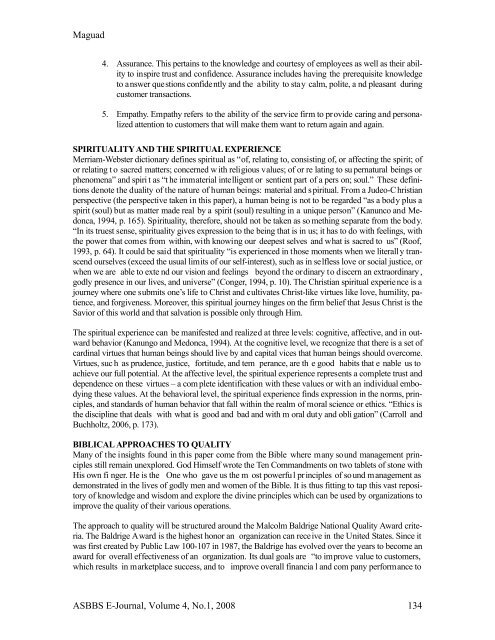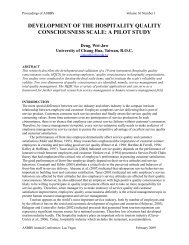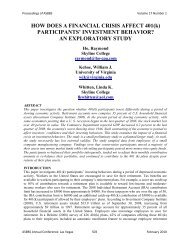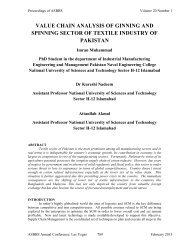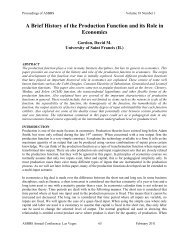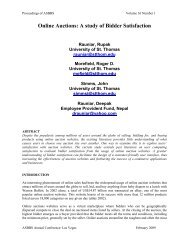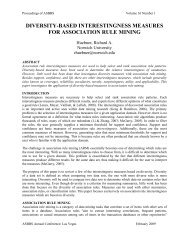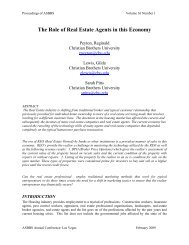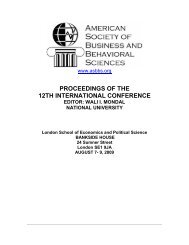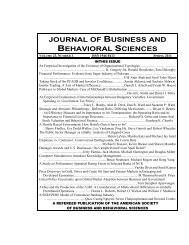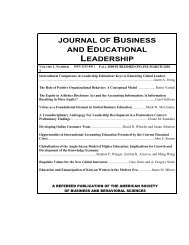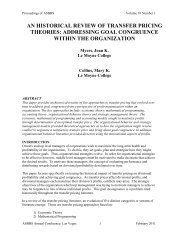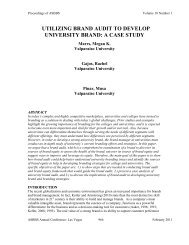stock repurchase announcements: a test of market ... - Asbbs.org
stock repurchase announcements: a test of market ... - Asbbs.org
stock repurchase announcements: a test of market ... - Asbbs.org
Create successful ePaper yourself
Turn your PDF publications into a flip-book with our unique Google optimized e-Paper software.
Maguad<br />
4. Assurance. This pertains to the knowledge and courtesy <strong>of</strong> employees as well as their ability<br />
to inspire trust and confidence. Assurance includes having the prerequisite knowledge<br />
to answer questions confidently and the ability to stay calm, polite, a nd pleasant during<br />
customer transactions.<br />
5. Empathy. Empathy refers to the ability <strong>of</strong> the service firm to provide caring and personalized<br />
attention to customers that will make them want to return again and again.<br />
SPIRITUALITY AND THE SPIRITUAL EXPERIENCE<br />
Merriam-Webster dictionary defines spiritual as “<strong>of</strong>, relating to, consisting <strong>of</strong>, or affecting the spirit; <strong>of</strong><br />
or relating t o sacred matters; concerned w ith religious values; <strong>of</strong> or re lating to su pernatural beings or<br />
phenomena” and spiri t as “t he immaterial intelligent or sentient part <strong>of</strong> a pers on; soul.” These definitions<br />
denote the duality <strong>of</strong> the nature <strong>of</strong> human beings: material and s piritual. From a Judeo-C hristian<br />
perspective (the perspective taken in this paper), a human being is not to be regarded “as a body plus a<br />
spirit (soul) but as matter made real by a spirit (soul) resulting in a unique person” (Kanunco and Medonca,<br />
1994, p. 165). Spirituality, therefore, should not be taken as so mething separate from the body.<br />
“In its truest sense, spirituality gives expression to the being that is in us; it has to do with feelings, with<br />
the power that comes from within, with knowing our deepest selves and what is sacred to us” (Ro<strong>of</strong>,<br />
1993, p. 64). It could be said that spirituality “is experienced in those moments when we literally transcend<br />
ourselves (exceed the usual limits <strong>of</strong> our self-interest), such as in selfless love or social justice, or<br />
when we are able to exte nd our vision and feelings beyond the ordinary to discern an extraordinary ,<br />
godly presence in our lives, and universe” (Conger, 1994, p. 10). The Christian spiritual experience is a<br />
journey where one submits one’s life to Christ and cultivates Christ-like virtues like love, humility, patience,<br />
and f<strong>org</strong>iveness. Moreover, this spiritual journey hinges on the firm belief that Jesus Christ is the<br />
Savior <strong>of</strong> this world and that salvation is possible only through Him.<br />
The spiritual experience can be manifested and realized at three levels: cognitive, affective, and in outward<br />
behavior (Kanungo and Medonca, 1994). At the cognitive level, we recognize that there is a set <strong>of</strong><br />
cardinal virtues that human beings should live by and capital vices that human beings should overcome.<br />
Virtues, suc h as prudence, justice, fortitude, and tem perance, are th e good habits that e nable us to<br />
achieve our full potential. At the affective level, the spiritual experience represents a complete trust and<br />
dependence on these virtues – a com plete identification with these values or with an individual embodying<br />
these values. At the behavioral level, the spiritual experience finds expression in the norms, principles,<br />
and standards <strong>of</strong> human behavior that fall within the realm <strong>of</strong> moral science or ethics. “Ethics is<br />
the discipline that deals with what is good and bad and with m oral duty and obli gation” (Carroll and<br />
Buchholtz, 2006, p. 173).<br />
BIBLICAL APPROACHES TO QUALITY<br />
Many <strong>of</strong> the insights found in this paper come from the Bible where many sound management principles<br />
still remain unexplored. God Himself wrote the Ten Commandments on two tablets <strong>of</strong> stone with<br />
His own fi nger. He is the One who gave us the m ost powerful principles <strong>of</strong> sound management as<br />
demonstrated in the lives <strong>of</strong> godly men and women <strong>of</strong> the Bible. It is thus fitting to tap this vast repository<br />
<strong>of</strong> knowledge and wisdom and explore the divine principles which can be used by <strong>org</strong>anizations to<br />
improve the quality <strong>of</strong> their various operations.<br />
The approach to quality will be structured around the Malcolm Baldrige National Quality Award criteria.<br />
The Baldrige Award is the highest honor an <strong>org</strong>anization can receive in the United States. Since it<br />
was first created by Public Law 100-107 in 1987, the Baldrige has evolved over the years to become an<br />
award for overall effectiveness <strong>of</strong> an <strong>org</strong>anization. Its dual goals are “to improve value to customers,<br />
which results in <strong>market</strong>place success, and to improve overall financia l and com pany performance to<br />
ASBBS E-Journal, Volume 4, No.1, 2008 134


